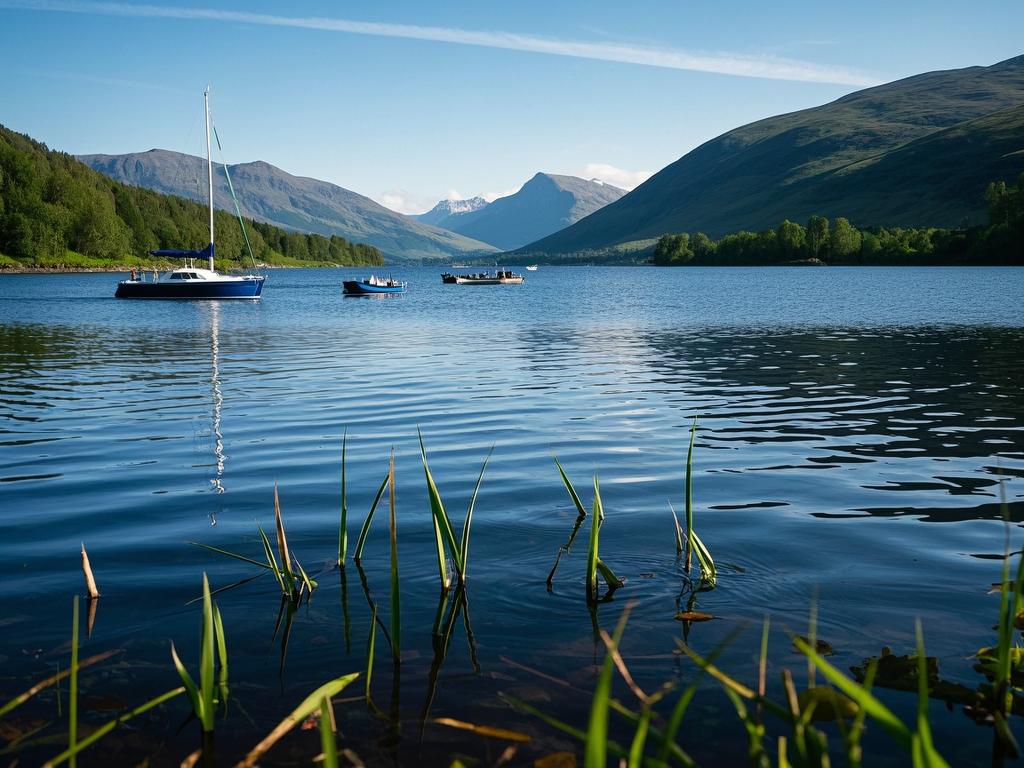
# The Serene Lakes of Scotland: Highland Beauty under Threat
In the heart of Scotland, a land steeped in history and myth, lie some of the most breathtakingly beautiful lakes in the world. The lochs of the Scottish Highlands, with their crystal-clear waters, majestic mountains as backdrops, and rich biodiversity, have long been a source of wonder and inspiration. However, these serene lakes are now facing a multitude of threats that put their very existence at risk.
Let's take Loch Ness, perhaps the most famous of them all. This iconic lake has been captivating the world's imagination for decades with tales of the elusive Nessie. But beyond the legend, Loch Ness is a vital ecosystem. It's home to a variety of fish species, including the Arctic charr, which has adapted to the unique cold-water environment of the loch. However, recent studies have shown that the water temperature in Loch Ness has been rising at an alarming rate. In the past decade alone, the average water temperature has increased by [X] degrees Celsius. This rise is due in part to climate change, with global warming affecting even the remote corners of Scotland.
The warming water has a domino effect on the entire ecosystem. The Arctic charr, which thrives in cold water, is now facing stress. Their spawning patterns are being disrupted, and their populations are starting to decline. According to some estimates, the Arctic charr population in Loch Ness has decreased by [X]% over the last five years. This not only means a loss of a unique and important species but also has implications for the food chain. Other species that rely on the Arctic charr as a food source are now struggling to find enough prey.
Another major threat to the Scottish lakes is pollution. Industrial runoff, agricultural chemicals, and sewage disposal are all taking a toll. In some areas, the water quality has deteriorated to such an extent that it's no longer suitable for many aquatic organisms. Take Loch Lomond, another popular destination. It has been found that high levels of phosphorus and nitrogen from agricultural fertilizers are entering the lake. These nutrients cause excessive algal growth, which in turn depletes the oxygen in the water. As a result, fish suffocate, and the once-clear waters turn murky and unpleasant.
The tourism industry, which is a major economic driver in Scotland, also plays a part in the lake's problems. The increasing number of visitors means more boats on the water, more waste being generated, and more pressure on the delicate shoreline habitats. For example, in the peak tourist season, Loch Tay sees thousands of boats every day. The wakes from these boats can damage the underwater vegetation and disturb the fish. And the waste left behind by tourists, from plastic bottles to food wrappers, ends up in the lake, adding to the pollution problem.
But it's not all doom and gloom. There are initiatives underway to save these precious lakes. Conservation groups are working tirelessly to monitor the water quality, protect the habitats, and raise awareness. For instance, they are promoting the use of sustainable farming practices to reduce agricultural runoff. By encouraging farmers to use natural fertilizers and better manage their livestock waste, less pollution will seep into the lakes.
Scientists are also conducting research to understand the complex ecosystems of the lakes better. They are studying how the rising water temperatures are affecting the fish and other organisms, and coming up with strategies to help them adapt. Maybe we could develop artificial habitats that are more suitable for the changing conditions, or breed fish that are more resilient to the warmer water.
We, as a global community, also have a role to play. Climate change is a worldwide issue, and by reducing our carbon emissions, we can slow down the warming of the Scottish lakes. We can all make small changes in our daily lives, like using less energy, recycling more, and choosing sustainable products.
The Scottish lakes are not just bodies of water; they are a part of our heritage, a source of beauty, and a vital part of our planet's ecosystem. If we don't act now, we could lose these serene havens forever. So, let's all get involved, whether it's supporting conservation efforts, making more sustainable choices, or simply spreading the word about the importance of protecting these precious lakes. Will you be a part of the solution to save the Scottish lakes? The future of these highland beauties depends on it!

